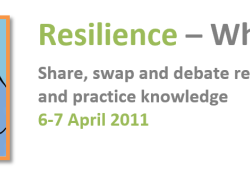Topic: Challenges in conceptualisation and operationalisation of Family Resilience – Ivana Maurović
Resources: You can download Ivana’s slides and read our Blog
Summary: Family Resilience is a concept that has wide and deep roots, ranging from the development of the concept of individual (child) resilience to the postulates of General Systems Theory, including Family Systems Theory and related therapeutic models as well as studies on family stress and coping. Integration of these roots into a comprehensive theory has not yet finished. Consequently, numerous ambiguities in conceptualisation and operationalisation of the concept of family resilience remain. Some of these are:
- How to define Family Resilience?
- How to operationalise elements of Family Resilience: risk, protective factors, good outcome?
- What is a good outcome on a family level?
- How to distinguish it from protective factors (for example family cohesion can be seen both as a protective factor and as a good outcome)?
- How to get the family and not the sum of individual’s perspective?
With the aim of clarification and understanding of this evolving concept, in this session, Ivana will give a review of the foundations upon which the concept of Family Resilience has emerged, as well as various ways in which resilience is conceptualised and operationalised in contemporary research.
Biography: Ivana Maurović is a postdoctoral fellow at the University of Zagreb, Faculty of Education and Rehabilitation Science, Department of Behaviour Disorders. She is a social pedagogue and certificated integrative psychotherapist. Her PhD thesis was about the resilience of young people in Children’s homes. Ivana has conducted numerous research projects on resilience appearing in different systems (mainly individual and Family Resilience).
At the Faculty she teaches courses on interventions with youth with behavioural problems (theoretical basis, interventions with young people in residential care as well as in a family setting, etc). Ivana has published 10 scientific articles, mainly on different aspects of the resilience of young people with behavioural problems. She has 10 years of experience of direct psychosocial work with children and young people with behavioural problems.
Who might be most interested: Mainly academics, researchers and students, but open to families and others as well.
Key readings:
DeHaan, LG, Hawley, DR & Deal, JE (2013). Operationalizing family resilience as process: proposed methodological strategies. In DS Becvar (ed), Handbook of family resilience (pp 17-29). New York: Springer.
Masten, AS & Monn AR (2015). Child and family resilience: a call for integrated science, practice, and professional training. Family Relations, 64, 5-21.
Patterson, JM (2002). Integrating family resilience and family stress theory. Journal of Marriage and Family, 64, 349-360.
This session took place on Thursday 2 February 2017.
The Resilience Forum is for ANYBODY (with a pulse!) involved with or interested in resilience research!


